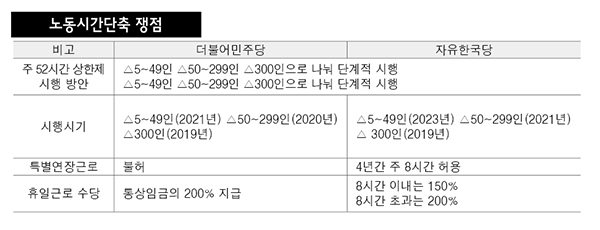
The Employment and Labor Subcommittee(Bill Examination Subcommittee) of the Environment and Labor Committee of the National Assembly discussed the amendment of the Labor Standard Act to reduce the working hours, but both the ruling and opposition parties failed to narrow the gap to reach an agreement on the revision.
Both the ruling Democratic Party of Korea(DPK) and main opposition Liberty Korea Party(LKP) in principle agreed to limit the maximum weekly working hours to 52 hours(at present, statutory working hours are 40 hours per week and 8 hours per day) with a phase-out approach of gradual implementation, categorizing businesses into three groups according to the number of employees hired(5~49, 50~299 and over 300 employees). The Phase I would commence in 2019, applicable to the companies employing more than 300, but two parties differ in the years of Phase II(DPK:2020; LKP:2021) and Phase III(DPK:2021; LKP: 2023).
However, they were in contention concerning the implementation period and special provisions on extended working hours and premium rate for holiday works. The ruling Democratic Party of Korea rejects any special provision on extended working hours and insists 200% premium rate for holiday works, while the opposition Liberty Korea Party argues for a grace period of 4 years during which 8 hours of extended work a week shall be allowed and premium rates of holiday work are 150% for working hours less than 8 hours and 200% for working hours exceeding 8 hours.
reported by Kim Hak-tae
translated by Kim Sung-jin

